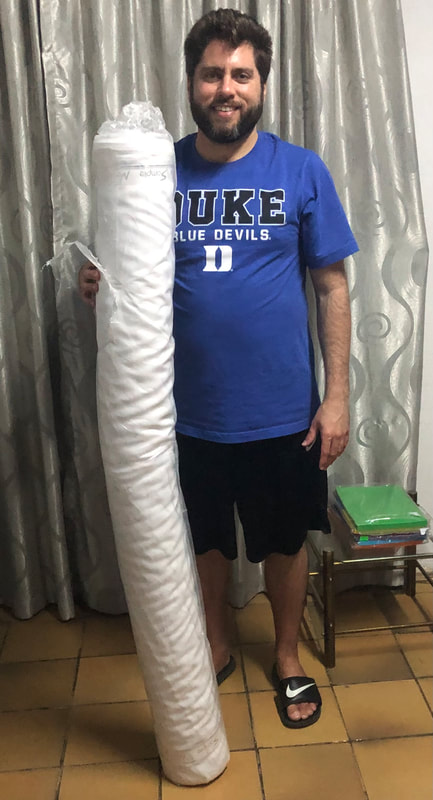A Wedding
 Yolanda with one of our Tuesday group women, waiting for the wedding to start
Yolanda with one of our Tuesday group women, waiting for the wedding to start The start of the month saw us attending the wedding of a son of one of our Tuesday group women. It was our first experience at a Shona wedding, although it was the white wedding. The “white wedding” is when the bride wears a white dress and has a vow ceremony and signing of a marriage license. Not all weddings in Zimbabwe are legally binding with a marriage license. Some only go through with a traditional ceremony, which do hold some rights locally, but none that protects a woman.
Even if Shona people have a “white wedding,” they always first have a “Roora Ceremony,” also called a traditional wedding. It entails paying the brideprice and wearing traditional Ankara fashions and fulfilling the many marriage rituals that are customary. We did not attend this ceremony, but were grateful to be invited to the “white wedding.”
Of course in common Shona fashion, the “promptly be seated at 9:45am” wedding, only started at 11:20am. The couple was married in the bride’s parents’ house. The ceremony in the back yard and the reception in the front yard. The dress code called for white and gold for women and black and white for men. Wearing white for a wedding doesn’t feel right to American standards, but was the expectation at this wedding.
In any case, we enjoyed the rest of our time there and left before dark, though the celebration clearly went much later. We could still hear the music from our house, about a mile away!
Below is a video of the bride's entrance at the ceremony. You'll see the grandmothers leading the procession. Then behind the bride, are all the aunties, trailed by the mothers of the bride and groom. Listen carefully to all the ululating of the women.
Women's Conference Prep
After the sixth order for tablecloths fell through from the third person we enquired from, we decided to go the route of renting them. Unfortunately, that turned into being 8 times more expensive or in the wrong colors that would not even be enough to cover all our tables anyway (insert eye roll). So days before the event, Yolanda reached out to a fabric factory and ordered a roll of white fabric from Harare. There was no time to cut and hem and actually make table cloths, but we simply rolled out the fabric across multiple long tables and made cuts and called it good (letting go of these little things is essential, otherwise we would drive ourselves nuts).
My (Yolanda) Shona friend who hosted a women’s conference a few months ago, did their entire conference in English. And although English is a national language in Zimbabwe, we have found English skills to be much poorer than years gone by (before Andrew moved to Zimbabwe). We also heard feedback from several of the ladies who attended the conference that some words were lost and the speed of communication made it so that not everything was understood. Of course having said that, they could not stop talking about how wonderful it was and so this is by no means a criticism of the event, rather just an observation. With the great importance of the message of this conference - salvation - we decided it was essential that everything be understood! The added benefit of translating is that attendees hear the message first in English and again in Shona and repetition is always helpful in memory retention and fuller understanding of content.
Immigration Interview
Now we’ll wait at least a month to hear back from immigration to know if Andrew finally got his residency after a decade and 3 attempts of applications. We would appreciate your prayers concerning this.
Conference Week
Below is a bit of a preview of the next blog. The first picture is at the very end, of everyone who attended!











 RSS Feed
RSS Feed